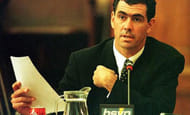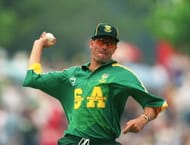Cricket as a sport was changed forever in the year 2000, when it was proven that South Africa’s captain Hansie Cronje was in contact with match fixing syndicates in India and had accepted bribes asking South African cricketers to deliberately under-perform in specific games. The allegations first arose in April 2000 when the Delhi Police uncovered suspicious tapes between Cronje and an Indian bookie named Sanjay Chawla, recorded during an ODI series between India and South Africa the previous month.
Cronje initially denied all such allegations. At a press conference on April 9, 2000, Cronje addressed a packed gathering and denied any and all charges of his involvement in the match-fixing scandal. However, two days later, Cronje reportedly phoned up Cricket South Africa’s managing director at the time, Ali Bacher. In the phone conversation with Bacher, Cronje confessed to having received between $10,000 to $15,000 for forecasting games and providing information to bookmakers during a tri-series involving South Africa, England and Zimbabwe in South Africa. Cronje was immediately sacked as captain of the South African cricket team, and his contract with Cricket South Africa was suspended.
As the shocking confessions came to light, suspicions also arose behind Cronje’s unusual decision to forfeit the Centurion Test Match in January 2000 between England and South Africa. An inquiry into the matter was ordered and It was decided that a Commision, led by retired Justice Edwin King, would be set-up to probe the matter. Hansie Cronje was no longer seen as a hero or as a leader of people by his countrymen. His image was tarnished. It was only a matter of time, before the facts about his real dealings would emerge out in the open.
On 7 June 2000, in Cape Town, South Africa, the goverment-appointed King Comission of Inquiry began it’s proceedings into the match fixing scandal. Former South Africa spinner Pat Symcox was the first player to testify at the hearing. He admitted to having received an offer to throw a match against Pakistan in 1994-95 from Cronje. Symcox further added that an offer of $250,000 was convened by Cronje during a team meeting at Mumbai in 1996 to lose a One-Dayer.
Over the next few days, as many as five other South African cricketers, including batsman Hershelle Gibbs and spinner Nicky Boje, confessed to having being approached by Cronje at some point in the past five years to under-perform in international matches. Gibbs admitted to have accepted Cronje’s offer of scoring less than 20 runs in a One Day International against India at Nagpur, in exchange for a sum of $15,000, on the morning of an ODI in March 2000. As things turned out, Gibbs ended up scoring more than 20 and never actually received the promised sum of money. It is believed that Cronje approached Gibbs among other players to keep the bookies away from constantly pestering him while he was on tour to India. But Gibbs’ evidence blew away Cronje’s consistent stance upto that juncture that he had not involved any other player in the match-fixing scandal.
Cricket South Africa’s managing director Ali Bacher told the Commission he had never questioned Cronje’s integrity as a Captain. He also spoke of an unrelated incident a few days earlier when during a chat with former Pakistani batsman Majid Khan, the subject of match-fixing in cricket was brought up. Bacher claimed he was aware of rampant fixing in the sport, especially from the sub-continental nations, and even mentioned two specific games between India and Pakistan, and between Bangaldesh and Pakistan during the 1999 Cricket World Cup that were fixed.
On June 15, 2000 Cronje read out a 22-page statement which documented his illicit activities in great depth, stating the figures and dates of his many dealings. He spoke chronogically about his involvement in fixing games, right from the first time he was approached by a bookie in 1995 before the Mandela Cup final against Pakistan in Cape Town. Cronje proceeded to talk about the 1996 Tour of India, when he was finally led to deal with bookmakers himself to lose specific Test matches. Cronje mentioned former India skipper Mohammad Azharuddin as the person who first led him to deal with a bookmaker by the name of Gupta, aka, MK. MK offered Cronje $30,000 to lose the Kanpur Test Match of 1996.
Cronje was introduced to two more bookmakers on the subsequent India tour to South Africa the following season. One of them was a London based businessman, a man called Sanjay Chawla. Cronje believed this was where things took a turn for the worse and testified about on-going negotiations between himself and the bookies to throw away games in return for large sums of money right through the tour.
Cronje is quoted having told the Court ‘I was not prepared to do it (delibertaly lose a match) unless we were assured of a place in the final of the triangular series. I was spinning them (bookies) along as I did not think I had any real intention of throwing a match. Sanjay (Chawla) handed me a cell-phone containing US dollars in case I decided to change my mind".
Cronje’s final run with the bookies happened when he returned to India, the same country he first started his dealings from, four years earlier. With no letting up from the two bookies, Cronje continued his secret conversations with the two men. And it was during one such taped telephonic conversation that the Delhi police finally got their hard evidence against Cronje. On 7 April, the news became open to the public. Cronje announced his retirement from all forms of cricket at the end of his hearing.
On 26 June 2000, Cronje begged for forgiveness as the first round of his hearings came to an end. And on 11 October 2000, Hansie Cronje, the former Captain of the South African Cricket Team, was banned for life from all activies of the United Cricket Board of South Africa and it’s Affiliates’. The announcement officially brought an end to his ordeal as the cricketing world listened with aghast to developments over the previous few months. The International Cricket Council (ICC) published it’s own Anti-Corruption Report by the end of the year in effort to stamp a base for it’s new stance on this latest evil in the sport. Cronje appealed his ban at the Pretoria High Court in October 2001, but his appeal was rejected.
The following year, Cronje died in a plane crash when his cargo plane crashed on approach close to his home town of George, in the Western Cape. His funeral was nationally televised, and his death was mourned by the nation, including his team-mates, many of whom he was unable to guide because, of his addmission for ‘an unfortuante love for money’. Cronje was 32. More than 13 years after the scandal first broke out, the Delhi police filed a chargesheet relating to the 2000 match-fixing epsiode and he was the only cricketer to be named in the chargesheet.
Looking for fast live cricket scores? Download CricRocket and get fast score updates, top-notch commentary in-depth match stats & much more! 🚀☄️


